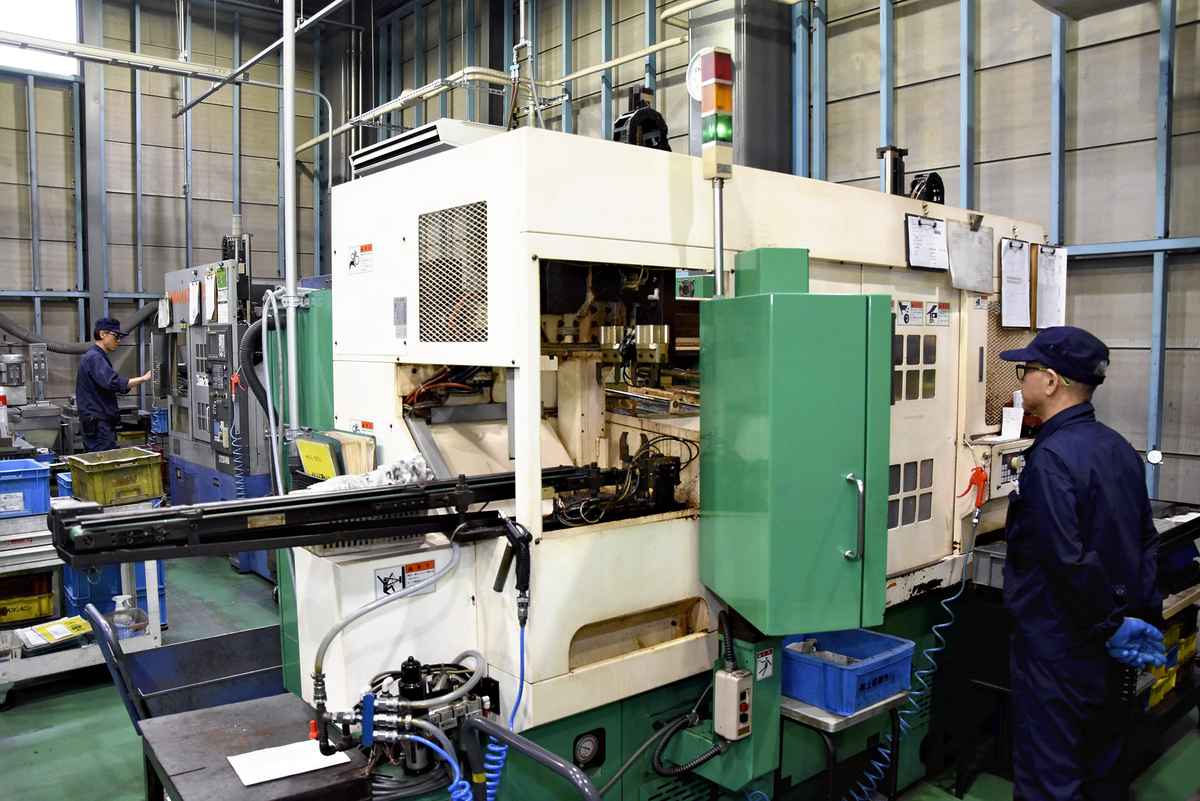Japan Auto Industry Increasingly Wary of U.S. Tariffs; Effects Will Extend to Large, Small Parts Manufacturers

Ueda-Manufacturing Ltd. produces parts for commercial vehicles at its plant in Ota Ward, Tokyo, in March.
17:36 JST, April 2, 2025
Business confidence among major Japanese manufacturers deteriorated in the March edition of the Bank of Japan’s quarterly Tankan survey — falling for the first time in a year — and sentiment may worsen further as U.S. President Donald Trump’s high tariff policies are expected to have their full impact on the Japanese economy from now on. The repercussions may be particularly felt in the automobile industry.
The Tankan results, released Tuesday, are also likely to affect the central bank’s decision about an additional interest rate hike.
Impact inevitable
Ueda-Manufacturing Ltd. in Ota Ward, Tokyo, produces bus and truck parts for major manufacturers of commercial vehicles. Its business performance has been stable, mainly thanks to increased demand for sightseeing buses. But once the United States imposes an additional tariff on foreign-made cars, it will inevitably hit the company.
“If the auto tariff is raised, it will damage our business partners’ sales of commercial vehicles. In that case, we may receive less orders for auto parts,” said company president Daisuke Ueda. “We’re on edge about news reports every day.”
The automobile industry is supported by a wide range of manufacturers and has a strong presence in the Tankan survey. While major automakers’ business confidence index improved in the latest survey, the business sentiment among small and mid-sized automakers declined seven points from the previous poll in December to plus 1.
If an additional tariff of 25% is imposed on Japanese cars imported to the United States from Thursday or later, it will inevitably impact not only automakers but also manufacturers of both large and smaller parts.
A slump in the auto industry, which is Japan’s key industry, could spread to other sectors.
As for forecasts of sentiment in the next Tankan survey, set for June, the outlook for major nonferrous metal manufacturers dropped 9 points to 6.
“A business decline in the automobile industry will have a significant impact on the Japanese economy,” said the president of a company in Itabashi Ward, Tokyo, that manufactures parts of prototype cars for automakers. “We want the government to take countermeasures.”
Service sector faring well
The service sector, on the other hand, continues to thrive. The sentiment index for large nonmanufacturers was at the highest level in about 33½ years. Although they expect sentiment to deteriorate by seven points three months ahead, the index still remained at a high level of 28.
In the face of continued price increases for raw materials such as rice, however, attention will be focused on to what extent customers will accept moves to pass costs onto products and services. The index for purchase prices, which indicates trends in purchase prices, among large nonmanufacturers rose 4 points from the previous quarter to 48.
Hero’s, which operates seven steakhouses in the Tokyo metropolitan area, said the buying price of U.S. beef has gone up 1.5 times in three years due to the weak yen. It has kept the price of its lunch set at ¥1,000, so its profit margin has declined.
“We cannot predict the possible impact of price hikes, so it’s difficult to make a decision,” said Yoshiaki Umemura, who manages the restaurants.
Serious labor shortage
The Tankan survey also revealed that the labor shortage in the country is increasingly serious.
The index for labor supply is calculated by subtracting the percentage of companies that said they have a shortage of labor from the percentage of those that said they have a surplus. In the latest Tankan survey, it was minus 38, down 1 point from the previous quarter, among businesses of all sizes in all industries.
Companies that are unable to secure sufficient labor despite opportunities to make profits will miss their chance to improve their business performance. The outlook for labor supply among small and mid-sized nonmanufacturers deteriorated 4 points to minus 52, indicating their prospects for a deepening labor shortage.
Shinwa Kogyo, a company in Shinjuku Ward, Tokyo, that installs intercoms and other devices, raised the wages of about 30 employees by an average of nearly 8% last year. But it has concerns for the future.
“We have no plans to hire new employees for the future. Unless we also improve employee welfare, it will be difficult for us to secure the necessary workforce,” said company president Yoshichika Obuchi, 53.
“The number of young workers will continue declining from now,” said Takeshi Minami, researcher at the Norinchukin Research Institute Co. “Small and mid-sized companies might collapse or be forced to consolidate themselves in succession, due to a labor shortage resulting from their inability to secure funds for raising wages.”
Related Tags
Top Articles in Business
-

Prudential Life Insurance Plans to Fully Compensate for Damages Caused by Fraudulent Actions Without Waiting for Third-Party Committee Review
-

Narita Airport, Startup in Japan Demonstrate Machine to Compress Clothes for Tourists to Prevent People from Abandoning Suitcases
-

JR Tokai, Shizuoka Pref. Agree on Water Resources for Maglev Train Construction
-

Toyota Motor Group Firm to Sell Clean Energy Greenhouses for Strawberries
-

KDDI Opens AI Data Center at Former Sharp Plant in Osaka Prefecture; Facility Will Provide Google’s Gemini AI Model for Domestic Users
JN ACCESS RANKING
-

Japan PM Takaichi’s Cabinet Resigns en Masse
-

Japan Institute to Use Domestic Commercial Optical Lattice Clock to Set Japan Standard Time
-

Israeli Ambassador to Japan Speaks about Japan’s Role in the Reconstruction of Gaza
-

Man Infected with Measles Reportedly Dined at Restaurant in Tokyo Station
-

Man Infected with Measles May Have Come in Contact with Many People in Tokyo, Went to Store, Restaurant Around When Symptoms Emerged




















